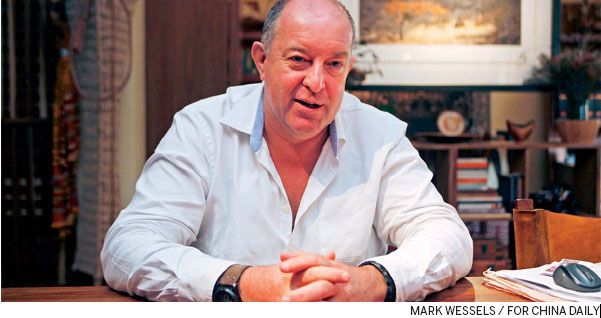The Power point strategist


China has a 'deepening and more sophisticated relationship with many African countries'
This story was originally published on June 7, 2013
Michael Power believes too many people in the investment world have "hissy fits" about minor movements in China's growth rate.
The strategist for investment managers Investec says many think the world is going to come to an end if the GDP figure in any one quarter is one or two basis points down.
"If you watch Bloomberg or CNBC and China's growth is down from 8.2 to 8.1 percent they all have this hissy fit," he says.
"What they don't seem to realize is that any growth is compounding on the year 2012. So China is currently adding every year a new Australia in nominal dollars. By 2018, that will be a new Germany and by 2021 a new Japan. That is a new Japan every single year."
Power, 54, was speaking from his office in central Cape Town, which also doubles as his home.
The walls are bedecked with antique map prints, African artifacts abound and in one corner there is a private cinema arrangement with a huge flat screen TV.
"I have 400 or 500 DVDs on that side of the room. I am a complete film buff," he says.
On the morning of our interview, Power was preparing to head off to The Hague in the Netherlands, where he was to address a conference.
He is responsible for what is described as Investec's "big picture thinking" and jetting off to do such presentations is part of his regular routine.
One of his big picture areas is Asia's role in Africa and, in particular, that of China.
He says the recent nervousness in Africa's resources sector reflected the same overreaction to China's slowing growth. This has resulted in falling commodity prices, creating nervousness in Johannesburg-listed mining stocks.
"The real reasons why prices have fallen is because the West has collapsed. Demand from China did not fall, the quantum of demand is as strong as ever. In 2012 China's thermal coal import volumes rose by 35 percent. The volumes are still coming out of China and they are enormous," he says. "What you have essentially is a Western-dominated media shifting the blame on the slowdown on the Chinese when the real culprit is the Western financial crisis."
Power points out China's trade involvement in Africa dates back to the Western Han Dynasty (206 BC-AD 24) but has been renewed on a considerable scale over the last decade.
He argues the catalyst for this was in 2000 when China ran out of domestically-sourced resources and it looked toward Africa to alleviate a "ballooning resources deficit".
"The first style of engagement - up to around 2005 - was perhaps a little brusque. They came in and bought out interests in Zambian copper mining and in the Angolan oil sector and did it pretty much 100 percent of the way they wanted to do it and without paying too much attention to local sensibilities."
Power argues that China now has a deepening and much more sophisticated relationship with many African countries and that it is now also not the only Asian country operating on the continent.

Pertamina, the Indonesian state-owned energy company, beating off competition from Chinese rival Sinopec to pay a record price for an Angolan oil block, is just one example. Thailand's PPT also recently acquired major oil fields in Mozambique.
"These investments show that China is no longer the only kid on the block. It might still be the main kid on the block, but it is certainly not the only one.
"You not only have the Indonesians and the Thais but the Brazilians have also come in. Even the copper belt in Zambia is now more Indian than it is Chinese."
Power, who almost has a thespian air, says Africa has pivoted more toward Asia than the West in the last decade.
"There has been this 20 or 30 years by the World bank and the IMF of finger wagging at Africa to which African countries have only really paid lip service," he says.
"Asian countries like China have a much more straightforward approach to business and African countries know which side their bread is now buttered."
Power was the third generation of his family to be born and brought up in Kenya before moving with his parents to Bahrain as a teenager.
He was educated at the leading UK public school Charterhouse before studying politics, philosophy and economics at Worcester College, Oxford, where he specialized in the politics and economics of the Middle East.
After doing a master's in international business and law at Tufts University in the United States, he embarked on a financial career that has included spells at N.M. Rothschild & Sons, HSBC and Baring Asset Management.
He has been in his current role since 2002 in which he frequently gives presentations and provides financial commentary for media all around the world. He recently sat on the South African government's Economic Advisory Panel.
Power says many people assume that China is the biggest investor in Africa today from the developing world but the actual largest is almost like the answer to a trick question.
"The largest investor in Africa from the emerging world is not China but South Africa. China is the second largest. It is not to be underestimated the importance of what that means. South Africa is the depository of a lot of finance and that finance is finding its way to the rest of Africa."
Power insists that Africa has come a long way since the infamous cover story The Economist magazine ran describing it as "The Hopeless Continent" in May 2000.
He says that although China has been a major player in the transformation since then, one of the drivers has been increasing rivalry between countries.
"The most powerful force for reform today is what your neighbor is doing. 'Oh, my God, look what the Tanzanians are doing, look what the Kenyans are doing'. It is keeping up with the Joneses or the Mwangis, as you might say, in the context of East Africa."
Power says in 2001 Africa began to grow faster than the global average with some countries such as Angola at 11.6 percent and Chad and Nigeria, both at 9 percent, enjoying rampant growth over the first decade of the century.
"It was shortly after the darkest hour of The Economist article. I think there has been a generational change on the continent. The post-post-colonial generation is now taking over both in business and in government and they are no longer always using their parents' excuse that it was the colonialists that got us into trouble."
He says that Africa is more attuned with the modern world than many in the West give it credit for. He points to the new iPhone's near field communications enabling it make mobile payments.
"Near field is the latest buzz phrase in the West where you can walk into your local Starbucks and pay for your latte with your phone. Well, we have been doing that in Africa for 10 years," he says.
Power says it is still too optimistic to think that the 21st century will belong to Africa as well as Asia.
"I think it is a bit disingenuous to call the 21st century anything other than Asia's," he says.
Some have suggested countries like Mozambique, one of Africa's growth success stories and a country that has benefited from China's resources demand, will look like Dubai in 20 years.
"Africa will be like Africa, whatever that means and I don't think it will be like anywhere else. It might have European, Asian or Middle East flavors but whatever the economic progress, it will be distinctly African."
(China Daily Africa Weekly 01/17/2014 page13)
Today's Top News
- Mainland increases entry points for Taiwan compatriots
- China notifies Japan of import ban on aquatic products
- Envoy: Japan not qualified to bid for UN seat
- Deforestation is climate action's blind spot
- Japan unqualified for UN Security Council: Chinese envoy
- China, Germany reach outcomes after discussions






























